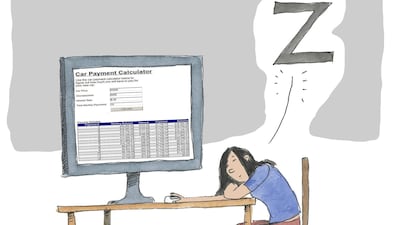We all make bad financial decisions at some point. What is important is to avoid doing it again by examining the reasons why you made them in the first place. There are certain factors you can control and others you can’t. Here are a few pointers to help you navigate a more financially sound path.
The top factors affecting your ability to make decisions are being poor, stressed and tired. You don’t have to be all three to suffer financial consequences. But if you are, then you’re on to the road to a very bad place.
The World Bank's report Mind, Society, and Behaviour published in 2015 states that the minds of the poor are taxed by the decisions they have to make daily — because they're poor — and so they go on to make more bad financial decisions. It is a vicious cycle because their brains are tired and maxed out.
Even if you are not poor, living with chronic levels of stress can have the same effect. A 2013 Science Magazine article associated this cognitive deficit — this preoccupation with daily issues — with a loss of 13 IQ points. This is equivalent to losing an entire night's sleep.
Studies show that people who are sleep-deprived make increasingly risky decisions, the longer the sleep deprivation lasts. What's worse is that they don't recognise or realise what's happening to them. A small study published in the Annals of Neurology showcases this by comparing two groups — one sleep-deprived, the other not. Most of the sleep-deprived group was unaware that their appetites for risk were increasing.
Other factors that influence the financial decisions we make include too much choice, peer pressure, not doing the basic maths, lack of self-control and even our DNA.
The reality of today’s world is there is just too much information out there. Too much choice leads to feeling overwhelmed and ultimately shutting down.
A 2000 Columbia University study involving jam jars and choice showed that the more jam jars there were to choose from, the more likely decisions were not thought through carefully. People were invited to take a jam jar home for free. The group presented with three to choose from went through a logical process to choose what benefited them the most. Those who had 20 to choose from made a decision much more randomly.
The same thing happens when we are presented (confronted more like) with too much information and choice around financial products. We may opt out, stick to what is familiar or ask a friend.
Which leads me to another mistake that should be avoided: you do what (you think) everyone else is doing. It is so much easier to look around your circle of friends, ask advice from someone you believe has their head screwed on right, and invest in the same thing they do. This may be easier than dealing with data overload, but be forewarned that you will be the one to suffer if it goes wrong.
Sometimes bad decisions are just a result of bad maths. OK, that might be a bit harsh. But what I mean is: it is challenging to have the big picture of the minute details of your financial life in your head. It is important to do the basic maths, keep track of your expenses and your savings, and then connect the dots. For example, people can be in (expensive) credit card debt, but keep the money that could pay it off in a savings account that pays near nothing.
Having self-control — shown to be an indicator of ‘success’ — is another factor. In the famous marshmallow test, young children were left in a room with a yummy marshmallow. If they waited until the nice person with the marshmallows came back, they would get two. If they ate it before the person got back, well, they weren’t headed for greatness going by the experiment’s findings.
Finally, your DNA could be to blame — specifically the variant of the COMT gene you inherit. The gene research that looks into this is controversial, but a study by the University of North Carolina links a variant of the COMT gene and the tendency to make impulsive decisions.
This last point may be beyond your control, but now that you are aware of the factors influencing your financial well-being, it is time to make the necessary changes. Remember, even if you can blame someone else for your bad financial decisions, you are the one who will be living the consequences.

